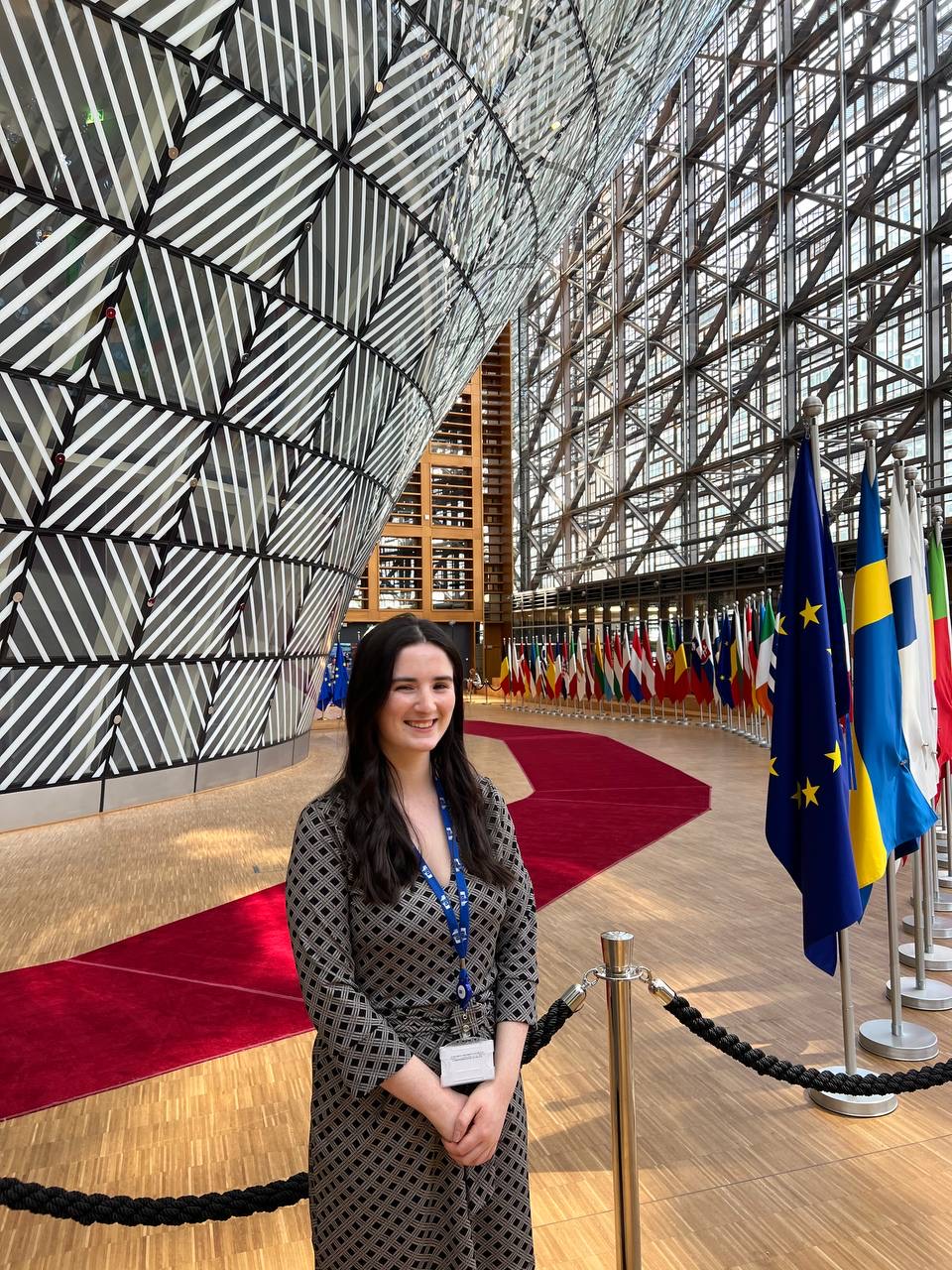| Code | MSCIPP |
|---|---|
| Duration | 1 Year Full-time; 2 Years Part-time |
| Teaching Mode | Full-time, Part-Time |
| Qualifications | MSc |
| NFQ Level | Level 9 |
| EU Fees | Full-time: €9,400
Part-time: €5,400
See Fees and Costs for full details. |
| Non-EU Fees | €18,500 |
| Closing Date | Rolling deadline. Open until all places have been filled. Early application is advised. |
| Non-EU Closing Date | Open until all places have been filled or no later than 15 June. Early application is advised. |
| Start Date | 7 September 2026 |
Course Outline
The MSc in International Public Policy & Diplomacy (MSc IPPD) at University College Cork is an innovative, interdisciplinary, taught master’s course that provides our graduates with the expertise required for successful careers in international policy environments.
Offering core modules from Government and Politics, History, Law and Food Business and Development, we give you access to expertise across a diverse range of subjects. The MSc International Public Policy & Diplomacy programme is strongly orientated toward vocational skills training, through coursework and an opportunity to undertake a work placement.
The MSc will be of interest to you if you aspire to a career in, or are already working in, departments of foreign affairs and other government ministries, international political and financial organisations, the armed forces, aid agencies, non-governmental organisations, think-tanks, and international businesses.
Programme Content
The MSc in International Public Policy & Diplomacy programme is divided into two parts totalling 90 credits.
Part 1 (60 credits)
In Part 1, students take a combination of compulsory and elective modules from selected disciplines. The core modules (40 Credits) invite you to engage with:
- the contemporary global challenges facing policymakers
- processes of government decision-making in relation to international affairs
- international economic policies and institutions
- international law
- the institutions and policies of the European Union (EU)
In addition, you will develop practical and analytical skills relevant to working in international affairs and gain an insight into personal and group dynamics associated with leadership.
You will also choose from 20 credits of elective modules offered by a wide range of disciplines including Food Business and Development, Government and Politics, History, Languages, Law, Management and Marketing, Philosophy, Sociology and Women's Studies. Students' choice of elective modules must be considerate of the programme's academic calendar, and in light of this, may be shaped by the programme's timetable.
Part 2 (30 credits)
Part 2 of the course challenges you to apply the skills acquired in Part 1 either by undertaking an independent research dissertation, or a work-based research dissertation as follows:
- GV6013 Work-based Dissertation in International Public Policy & Diplomacy (30 credits) or
- GV6014 Dissertation in International Public Policy & Diplomacy (30 credits)
On completion of the course, you will be able to identify and assess global policy challenges and global policymaking processes and will have gained expertise in analysis and evaluation, report writing, oral presentation skills and leadership.
Academic Programme Catalogue
See the Academic Programme Catalogue where you can search for the complete and up-to-date content for this course. Note that the modules for all courses are subject to change from year to year. For complete descriptions of individual modules, see the Book of Modules.
Course Practicalities
The taught part of the course runs from September to the end of the following March. You will complete the research dissertation between April and the end of September.
The part-time option will be taught during weekday working hours over two years.
During the taught part of the course, students have approximately 8-10 hours per week of lectures/seminars. This is supplemented by recommended reading, preparation of presentations and other group work and time spent completing assignments (essays, policy reports, research projects, etc).
In Part 1, the course is assessed through a variety of coursework assignments, including
· exams
· research essays
· policy reports
· presentations
· group work
· seminar discussions.
The assessment is designed to help you to develop both an understanding of issues and the practical skills necessary to work in international affairs.
In Part 2 of the course, students complete a research dissertation which takes the format of either a 15,000-word independent research dissertation or an 7,500-word work-based research dissertation & a 1000-word placement practice report.
Core modules are taught by staff of the Departments of Government and Politics, Law, History and Food Business and Development. Elective modules are offered by Food Business and Development, Government and Politics, History, Languages, Law, Management and Marketing, Philosophy, Sociology and Women's Studies. Our staff has expertise in areas such as global governance/international organisations, foreign policies and foreign policy decision-making, the European Union, international law and human rights, gender politics as well as in more specialised areas such as US foreign policy, European security and migration.
Why Choose This Course
Key features of this MSc include its focus on policy issues and the way in which it gives you the practical skills necessary to work in international policy environments.
In this programme you will engage with the most contemporary debates and issues facing the global policymaking community and have direct interaction with current and retired policy-makers through classes, guest lectures, and department seminars. These features afford our graduates a competitive edge: past students repeatedly comment on the value of the skills component of the course in exposing them to international environments and in engendering a deep understanding of this exciting and evolving field.
Placement or Study Abroad Information
Work-based research dissertation
As part of this programme students must complete a research dissertation. Some students will have the opportunity to complete their research dissertation in a work placement setting that can range in duration from three to five months.
Students who undertake a work-based research dissertation, do so with a variety of organisations/institutions working in areas related to international affairs, such as government ministries, international organisations, the offices of elected representatives, think tanks and non-governmental organisations. Students have been assigned placement opportunities in major international cities, such as Brussels, London, and Washington DC, as well as in Cork and Dublin.
- The programme continues to work within national and international public health guidelines as a result of the coronavirus pandemic. International travel restrictions may apply across come countries. Since the pandemic, work-from-home advisories and/or a blended and hybrid approach of remote and on-site working apply in many sectors. These parameters shape the format and extent of placement offerings.
Specialist career advice is available to students through a Work Placement Manager and support is provided in the planning for and application to work placement organisations. Classes offering career talks, advice, and skills also form part of the course delivery.
Skills and Careers Information
We recognise the importance of equipping our students with the skills they need to progress following graduation. You will be given expert advice on career development by a dedicated work placement manager and also have access to UCC’s Career Services.
The course has established links with important international policy institutions from which you will benefit. Having completed the course, you will be a skilled analyst of international affairs and have the confidence and experience to apply that expertise in the real world.
Requirements
- The minimum requirement for applicants is a Second Class Honours Grade I in a primary honours degree (NFQ, Level 8) in any subject;
- Applicants who hold a Second Class Honours Grade II in a primary honours degree (NFQ, Level 8) will also be considered under Recognition of Prior Learning (RPL) subject to their 'motivation statement' and references;
- In exceptional circumstances, substantial professional experience in a relevant field may be accepted as compensating for the absence of an undergraduate degree, subject to approval by the programme director and the College of Arts Celtic Studies and Social Science.
- All applicants will be required to submit a 'personal statement' (indicating why they are interested in taking the MSc (International Public Policy and Diplomacy) and why they think they would be suited to the programme.
For Applicants with Qualifications Completed Outside of Ireland
Applicants must meet the required entry academic grade, equivalent to Irish requirements. For more information see our Qualification Comparison page.
International/Non-EU Applicants
For full details of the non-EU application procedure visit our how to apply pages for international students.
- In UCC, we use the term programme and course interchangeably to describe what a person has registered to study in UCC and its constituent colleges, schools, and departments.
- Note that not all courses are open to international/non-EU applicants, please check the fact file above. For more information contact the International Office.
English Language Requirements
Applicants who are non-native speakers of the English language must meet the university-approved English language requirements. Visit our PG English Language Requirements page for more information.
Fees and Costs
The EU fee for this course is Full-time: €9,400 Part-time: €5,400 .
The Non-EU fee for this course is €18,500.
Postgraduate EU and International Fees 2026/2027
See our Postgraduate EU and Non-EU (International) Fee Schedule for the latest information.
Deposits
If your course requires a deposit, please note that booking fees and deposits are non-refundable in all cases.
How can I pay?
See different options on our How Do I Pay My Fees? page.
Any questions? See the 'Contact Us' section on the Fees Office page.
How To Apply
1. Check dates
Check the opening and closing dates for the application process in the yellow fact file boxes at the top of this webpage. The UCC online application portal usually opens around mid October.
2. Gather documents
Scanned copies of supporting documents have to be uploaded to the UCC online application portal and include:
- Original qualification documents listed on your application, including transcripts of results from institutions other than UCC.
- Any supplementary items requested for your course, if required.
3. Apply online
Apply online by clicking the red 'Apply Now' button below. Note most of our courses have a non-refundable €50 application fee.
Any questions? Use our web enquiry form to contact us.
Additional Requirements
Please note you will be required to provide additional information as part of the online application process for this programme. This will include the following:
- You may enter the details of professional or voluntary positions held. We strongly encourage you to complete this section with all relevant work experiences that will support your application.
- Please describe your motivation and readiness for this programme. The selection committee for the MSc in International Public Policy and Diplomacy attaches strong importance to the online motivation statement. The motivation statement must be at least 500 to 1000 words and must demonstrate the applicants' motivation and readiness for the programme.
- After the application is submitted, you will be required to enter the names and email addresses and request 2 references from the application portal. At least one must be an academic referee, who can provide a reference for previous relevant academic performance, qualifications, and aptitude.
The closing date for non-EU applications is Open until all places have been filled or no later than 15 June. Early application is advised.
Apply Now


